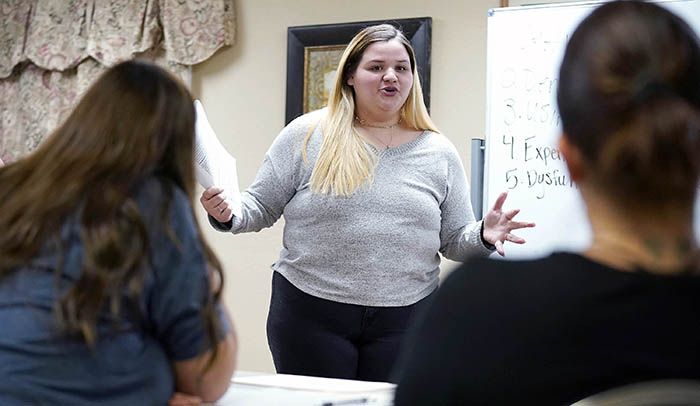
Story by Mike Kilen
Photos by Ralph Freso
GCU News Bureau
Three women recently released from prison finish supper at the kitchen table in a house near Northern and 17th avenues in Phoenix, not far from bus stops where traffickers proposition them on their way to work cleaning cars or answering phones.
One woman was just days free of nearly seven years in jail and was trying to remember how to sleep, while another was just trying not to be afraid anymore.
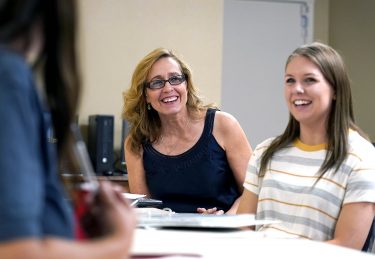
They await the arrival of two college students who seem worlds apart – counseling majors at Grand Canyon University. They didn't expect this new generation to be "for Christ."
“You can see the spirit in their lives. It’s what we want,” said a former inmate.
The women clean up dishes at the house, one of 18 in the central Phoenix area owned by Along Side Ministries, which offers incarcerated men and women a place to live and spiritual and practical guidance in their transition to the free world. They get jobs, pay a portion of their salary in rent and partake in Bible study and life skills training.
Denise Krupp, a counseling instructor at GCU, has filled in a missing piece over the past year. She heard Along Side Executive Director Ken Sheets speak at her church, and Krupp thought she could do more than volunteer to mentor inside the prison. She volunteered through her church to provide Christ-centered educational skill groups to help former inmates with their transition into the outside community, mentoring them in relapse prevention, social-emotional well-being, anger management, conflict resolution and a host of topics from a Christ-centered, evidenced-based viewpoint.
“I always have my students in mind and wanted them to participate in this,” Krupp said of six GCU students so far who have volunteered to help. “It gives them an opportunity to practice the skills they are learning in the classroom. It gives them that real-life person in front of them instead of all the mysteries of what it might look like.”
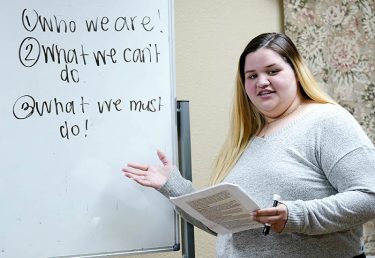
GCU students Christine Mahnke and Alexis Alvarez arrive, greeting the women as they gather around a large table on a recent evening. Both are studying for a degree in Counseling with an Emphasis in Addiction, Chemical Dependency and Substance Abuse and say they pursued the study because family members or friends suffered with addictions.
“I want to open my own outpatient rehab. I think substances are taking over our generation,” Mahnke said.
It’s a huge part of the problem for many who are incarcerated – up to 85% have substance-abuse disorders, Krupp said.
Inmates live in a structured environment for years without stimulation, long hours of the day alone in a cell without enough rehabilitation, and are expected to return to free society ready to turn their lives around.
“Imagine being five years in prison and all of a sudden you come out and have to integrate back into the community. It’s overwhelming,” Krupp said.
She often offers students the example of a client in her agency work. He was in prison 10 years, and upon release his children got him a mobile phone, which rang during a session. He handed it to her, saying, “I don’t know how to use this thing. I don’t know what it is.”
“They are completely severed from society while life goes on,” she said.
Along Side Ministries launched in 2000 and includes staff and volunteers who first meet with the inmates for nine months before their release, discussing life skills and helping connect them to spirituality and how to live in a Christian community once they transition out of prison.
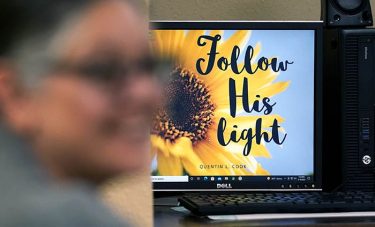
The nonprofit relies heavily on donations to run its 18 transitional homes, which Sheets said are valued at more than $60 million. He said that 92% of the men and women who come through the program and live an average of nine months in their homes don’t return to prison compared to only 30% of former inmates who stay free nationwide. He’s even seen murderers turn their lives around.
“We know that Jesus is a big difference,” he said.
GCU students who sign up to volunteer through Krupp have an easy manner in interaction with the residents, Sheets said, free of harsh judgments.
“Me and Christine are just students, but it’s nice to be treated like we are already in the field," Alvarez says.
That is evident as the group begins, even though it’s only the second session with the women after meeting with a men’s group for several months. Mahnke takes them through steps that may lead to relapse, including triggers.
One woman said her trigger is the sight of needles, a flashback to methamphetamine use that derailed her life and could again.
Another fears running back to bad relationships to feel better about herself after losing her bank job of 10 years, losing custody of her children and going to prison. “I don’t have my own place or my own car, so who am I going to attract? Someone on the bus or homeless?” she told the group. “And that will be someone who more than likely is using.”
A woman convicted of armed robbery wonders about taking an open job in her old neighborhood, fearing she would fall into bad habits in that setting.
“It’s good to know that it was going to be a high-risk situation,” Mahnke told her.
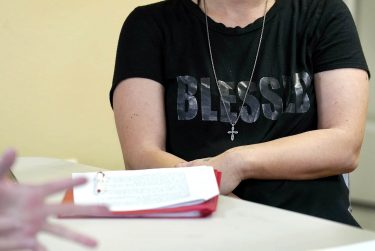
Talk veers toward regret and disappointment about where their lives have gone and anxiety about how they can make tomorrow better without satisfying those triggers.
“When you go too far in the future you come back to today,” Krupp said. “When you go too far in the past you got to come back to today. Do you find your peace when you do that?”
Alexis chimes in, adding a verse from Matthew that asks if worrying adds to your life. It doesn’t. “You are just spending all that time being anxious about something that hasn’t happened yet,” she said.
“You all know God has a plan,” Mahnke adds. “Just take it one day at a time and it will be great.”
The women want to distance their minds from the unhealthy nature of prison, but starting over can fill them with anxiety. Talking with students they call "joyful" helps.
Alvarez says the women are vulnerable and welcoming.
“When you learn something in school, it’s so easy to think of things like a textbook,” Alvarez said. “But these are real people. So we’re taking what we’ve learned into real experiences. I love getting to know their stories and how far they’ve come. A lot of people don’t think their own voices matter, but they do. This gives them a voice.”
The night ends with Mahnke leading a prayer. She asks God for guidance in their recovery.
Grand Canyon University senior writer Mike Kilen can be reached at [email protected] or at 602-639-6764.
***
Related content:
GCU Today: First cohort set to help battle mental health crisis
GCU Today: School counseling ‘pioneers’ on path to aid students



































































